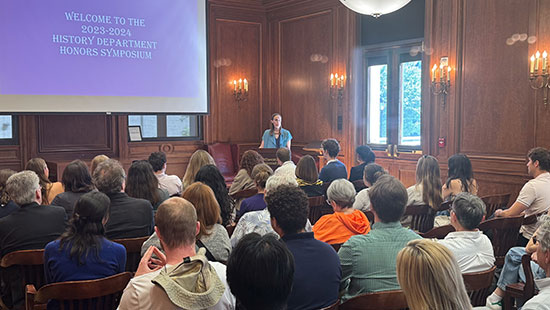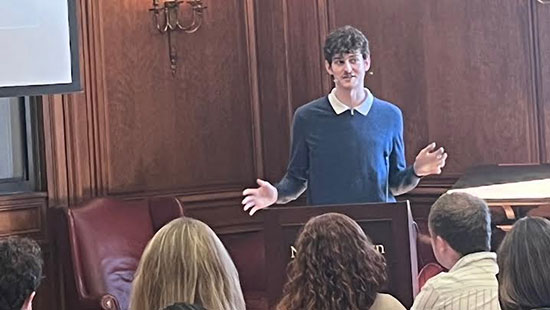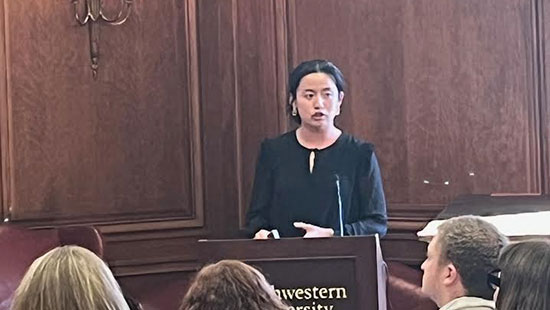The Undergraduate Honors Thesis Experience
The Thesis Experience
By Wyatt Browdy
A real strength of our History Department—a strength that seems increasingly rare—is the close connection between students and faculty. When I realized I wanted to study History more seriously and adopted it as my major, Professor Jeff Eden spent hours and hours describing the wonders of archival research, recalling his own fascinating stories and insights. I was sold on writing a senior thesis with archival sources, but I had no idea where to look or what to do. I wanted to write about the Russian Revolution, but my limited Russian language skills proved troubling. After a summer of snooping around various Chicago archives, I emailed then-University Archivist and current University Historian Kevin Leonard asking if he had anything interesting, perhaps even something related to Russia. Kevin informed me that the family of a Northwestern alumnus named Edgar Sisson had dropped off several boxes of files—ten in total—from Sisson’s time as an American diplomat in Russia. I thought I recognized Sisson’s name from other archival sources I had seen, so I met Kevin to look at the boxes.
What I found in Edgar Sisson’s archival boxes amazed me. Sisson was stationed as a propaganda man in Petrograd during World War One, but, upon his arrival, Russia was well on its descent into revolutionary madness. As I sorted through the boxes, I found original documents from across Europe: postcards with the faces of Bolshevik leaders, anti-German propaganda, letters from FBI director J. Edgar Hoover, and even a signed and personalized portrait of the first Czech president, Thomas Masaryk. The Sisson Papers also filled in a real gap in historical literature—many histories had been written about Americans in the Russian Revolution, but none used Sisson’s files. I was ostensibly the first historian to work with Sisson’s personal papers. Edgar Sisson’s contribution to the war effort was rather problematic, though: he circulated a rumor that the Bolsheviks were agents of the German government, even publishing a list of 68 fabricated documents. While Sisson’s propaganda was unconvincing in Europe, it contributed to the harassment and arrests of hundreds of Americans, both radicals and non-radicals alike.
The thesis seminar provided me with innumerable benefits and memories. First, I was able to work closely with faculty whose work I deeply admire. I was also able to work directly with century-old archival material that has not appeared in any other academic literature to date. Finally, I was able to do all of this in the context of the seminar itself, which was perhaps my favorite part of the experience. All nine of the thesis writers were on unique journeys—I was working with Sisson at Northwestern while Will Clark was in France and Phoebe Cahill was interviewing federal employees in D.C.—but the seminar class allowed us to work through Big Historical Questions together: how do we ascribe agency to different actors? How can we write about what sources don’t say? How are we to understand historically specific ways of life different from our own? Over the last year, we worked through these questions and many more together in Harris Hall. Our theses will hopefully be able to scratch at some answers to these eternally mystifying questions.
In Their Own Words:
Tess Ballis
“The ‘most despised’: An Intersectional Analysis of Disabled Jews in the Holocaust”
I found that Holocaust-era social constructions of disability and Jewishness interacted to create distinct struggles and experiences for disabled Jews. Therefore, accounting for intersectionality is a necessary part of studying this subfield of Holocaust history with complexity and accuracy.
Honorable Mention: 2024 Grace Douglas Johnston Award for the best senior honors thesis in History
Wyatt Browdy
"Reds, White, and Blue: American Diplomacy and Misinformation in the Bolshevik Revolution"
My thesis analyzes the actions of the American diplomats stationed in Petrograd after the Bolshevik Revolution broke out during World War One. These diplomats used drastically different methods to keep Russia in the Entente war effort but ultimately failed, commencing 15 years of non-contact between the Soviet Union and United States governments.
Phoebe Cahill
"Chips of Influence: Semiconductors, Offshoring, and American Politics"
My thesis argues that despite being warned by various government and semiconductor organizations that offshoring chips would jeopardize American national security, Ronald Reagan, George H. W. Bush, and William (Bill) Clinton each committed to neoliberalism––a political order which emerged under Reagan and lauded free market policies while denouncing industrial policy.
In essence, these three presidents prioritized short-term considerations, including voters’ demands for less government intervention and companies’ desires for lower costs and higher profits, over long-term national security concerns.
Elie Clark
"Winging It: A Social History of U.S. Airline Pilots from 1940 to 2001"
The cumulative impact of airline management decisions following airline deregulation in 1978, social movements, and hijacking provide a more nuanced understanding of the current commercial pilot shortage afflicting U.S.-based airlines.
William Clark
"Haitian Modernity and its Misapprehension: Liberalism, Development, and Capital in the Age of Revolution"
Clark's thesis focused on Franco-Haitian relations between 1820 and 1848, specifically investigating how and why French liberal and abolitionist discourse on Haiti shifted throughout the period. He found that, while many French liberals initially celebrated Haiti as a potential post-abolition model, as time went on, they grew disappointed in the country as its population increasingly rejected global capitalism and began experimenting with new, more radically democratic forms of social, economic, and spiritual organization.
Honorable Mention: 2024 Grace Douglas Johnston Award for the best senior honors thesis in History
Aimee Flanigan
“The Project of Total War and the Minnesota Starvation Experiment, 1944-1945”
Joanna Hou
"Wages for Housework: The Promise That Broke a Movement"
The Wages for Housework movement, which largely ran between the years of 1972-1977, recognized women's reproductive labor as exploitative and essential to sustaining capital – and promised an imminent revolution. However, this thesis examines how the movement's rigid theory and inflexible core leadership led it to an early and complicated demise, one underexplored in historical scholarship.
Winner of the 2024 Grace Douglas Johnston Award for the best senior honors thesis in History
Lauren Huttner
“Space for Self-Determination: Transforming Indian-Bolivian State Relations in the 19th Century”
Carter Popkin
"Consumer Welfare Fallacy: How Robert Bork Elevated Big Business Through Antitrust"
My thesis contends that Robert Bork's antitrust scholarship was the product of agenda-driven legal research and law office history. Additionally, it argues that contemporary legal scholars pointed out the fallibility of Bork’s scholarship, but that the Supreme Court ignored these critiques and adopted Bork's ideas.









